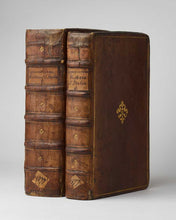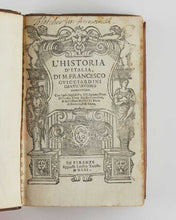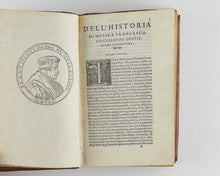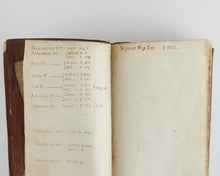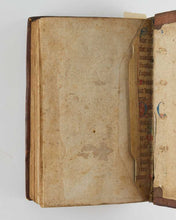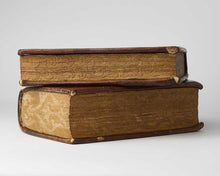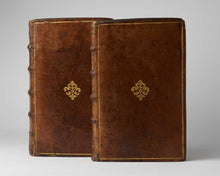
GUICCIARDINI, Francesco. L’historia d’Italia. Florence: Lorenzo Torrentino. 1561.
Two vols, 8vo. Contemporary French brown calf, gilt-fillet border to covers, gilt fleuron to centres, spines blind-ruled in compartments between raised bands, gilt fleurons to centres and 18th-century paper label with titles in ink, shelf-labels at foot, edges gilt and gauffered in floral design, vellum waste guards from two fifteenth-century manuscripts; pp. I: [16], 480; II: 481-1295, [1]; title within architectural woodcut border, woodcut portrait of the author, woodcut initials; spine ends repaired, extremities a little worn, wanting ties; occasional light staining and ink marks, but overall a very good, crisp copy; manuscript index in a neat, early hand to front free endpapers of vol. I; “whose hors” in a 16th-century hand to rear free endpaper of vol. II; ownership signatures “Afletcher” and “Jos: Arrowsmith” to titles (see below).
First octavo edition, published the same year as the first folio edition, of Guicciardini’s historiographical milestone, preserved in an attractive contemporary French binding, and with an interesting English and Scottish provenance.
Arguably the high point of Italian humanist historiography, the Historia d’Italia (History of Italy) is celebrated for both its analytical rigour and breadth of research, being the first history to demonstrate “the synchronistic interdependence of political events all over the [European] continent” (PMM 85). Francesco Guicciardini (1483-1540), the scion of a distinguished Florentine family and a friend of Niccolò Machiavelli, composed the work between 1537 and 1540, drawing on his long experience as a statesman and as ambassador to Spain. Covering the years 1492 to 1534, the Historia offers a vivid narrative of the first four decades of the Italian Wars (1494-1559), a long series of conflicts centred on the Italian Peninsula involving the French kings, on one side, and the Holy Roman Empire and Spain on the other, as well as various Italian states at different stages. Guicciardini depicted this period as one of decline following the splendour of the Renaissance courts, and traced the collapse of Italy’s “tranquillity” – that time of “happiness” culminating around 1490 – not to the aggression of foreign powers, but to the failures of the Italian states themselves and to the inherent fragility of the peninsula’s political structure.
Edited by Guicciardini’s nephew Agnolo, the Historia first appeared in 1561 in a folio edition printed by Lorenzo Torrentino, twenty-one years after the historian’s death; later that same year Torrentino also issued the present octavo edition. A complete edition was published in Venice in 1567, and several re-issues followed: within the sixteenth century alone it saw at least ten editions in Italian, three each in Latin, French, and Spanish, and single editions in English, German, and Dutch. Its impact was immediate and far-reaching: Jean Bodin and Michel de Montaigne were among its early fervent admirers, and David Hume cited Guicciardini extensively in his History of the House of Tudor (1759). By the nineteenth century, however, Guicciardini’s reputation began to wane. Though Leopold von Ranke, the German founder of modern source-based history, described the Historia d’Italia as “the basis of all later works on the beginnings of modern history”, he also faulted the author for his lack of systematic engagement with first-hand sources, remarking that “the establishment of facts did not matter greatly to him”. Such criticisms, compounded by factual inaccuracies, gradually dimmed the aura of Guicciardini as the great historian of Renaissance Europe.
Provenance:
1. Late seventeenth-century ownership inscription of Joseph Arrowsmith, possibly the author of the Restoration satire The Reformation (1673).
2. Andrew Fletcher (1655-1716) of Saltoun, author, politician, and ardent opponent of the 1707 Act of Union. By descent to:
3. John Theodore Talbot Fletcher (1903-1995), sale, Sotheby’s, 21-23 November 1966, lot 316, to Maggs Bros.
Edit16 CNCE 22305
#2122738







